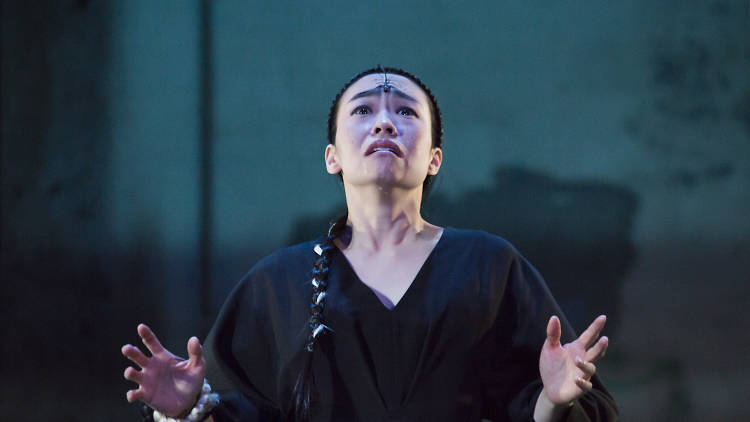Photograph: Courtesy Gaia Squarci
Anyone who has been watching the last few decades of David Herskovits’s experimental work will know the man has a classical mind. It’s not just that the director of Target Margin Theater, who has a history of producing Aristophanes and Euripides, loves the Greeks. It’s that his theatrical gods are discipline, abstraction and clarity; he employs the classical attitude, in which the thinker reduces his way to truth. Entertainment as such isn’t in that pantheon of virtues, you’ll notice. Herskovits isn’t out to razzle-dazzle us; instead, he maintains a focus on a text in the hopes that the heat will kindle our own curiosity. Knowing this might help in approaching Target Margin’s production of Mourning Becomes Electra, which is customarily arch, seriously clever and very, very long. Including the two intermissions, you’ll be watching Eugene O’Neill’s 1931 psychological melodrama for five full hours. Buckle up.
In Electra, O’Neill adapts Aeschylus’ Oresteia: his three-play cycle sets the events of the ancient trilogy just after the Civil War, as the wealthy Mannon family rips itself apart. Lavinia (Eunice Wong) suspects that her mother, Christine (Stephanie Weeks), has been unfaithful to her father, Union general Ezra (Satya Bhabha). Lavinia’s rage—part sexual jealousy, part loyalty to her father, part love for her war-ravaged brother, Orin (also Bhabha, in a bandage)—overheats the Mannon house, stirring up homicidal energies. Christine’s lover, Captain Adam Brant (Bhabha yet again) dreams of the sea and the sweet airs of the South Sea Islands, but there is no escape; the family is caught in its spiral of incestuous possessiveness. Orin goes mad. Christine goes mad. By the end of the cycle, Lavinia herself has gone full Miss Havisham, nailing shut the Mannon mansion’s windows so she can boil in her family’s shame, alone and in the dark.
As Herskovits notes in the program, he and his actors have been working on notions of “distance” and “closeness.” The actors toggle among three modes: the strike-a-pose melodrama of the 19th century (appropriate to the Gothic plotline); a conventional, contemporary expressiveness; and an un-style that imitates the “marking” that actors do when rehearsing their blocking. The audience changes, too: We watch the first section from the balcony, the second from the rear of the orchestra—it feels like being in a technical rehearsal, with all the empty seats in front of us—and the final section from closer seats and then, closer still, on the stage. The miked actors sometimes drop into near-murmurs, so lines seem to come from speakers just over our shoulders. It’s a series of design and staging coups; for this alone, people (with long attention spans) should see it.
O’Neill is an artist who tended to insist on his effects: Mary McCarthy, that inveterate kvetcher, compared his dogged, persistent rhythms to “elephants pacing in a zoo.” Herskovits carefully amplifies that insistence by forcing us into increasing proximity with it. It’s a smart way to build the event—and although it’s not actually a flattering approach to the play, which here seems often glutinous, it showcases the company gorgeously. Weeks does tremendous work in an operatic style; her Christine oozes around in a slinky green evening gown (the clothes are designed by Kaye Voyce), a Joan Crawford of the Lower East Side. Bhabha is very good too, negotiating three characters with ease. But ultimately, Electra is Wong’s show. She’s great at a distance, icy and commanding, and she’s still exerting incredible control near the end, when we’re near enough to see the clips in her hair. But it turns out that Wong has been burning a very long fuse; as we get up close, we see gunpowder in her eyes. It’s frightening when we realize she’s starting to spark. We only just have time to realize that Herskovits has put us right next to her—when the bomb goes off.
Abrons Arts Center. By Eugene O’Neill. Directed by David Herskovits. With ensemble cast. Running time: 5hrs. Two intermissions. Through Sat 20.
© 2019 Time Out America LLC and affiliated companies owned by Time Out Group Plc. All rights reserved. Time Out is a registered trademark of Time Out America LLC.


